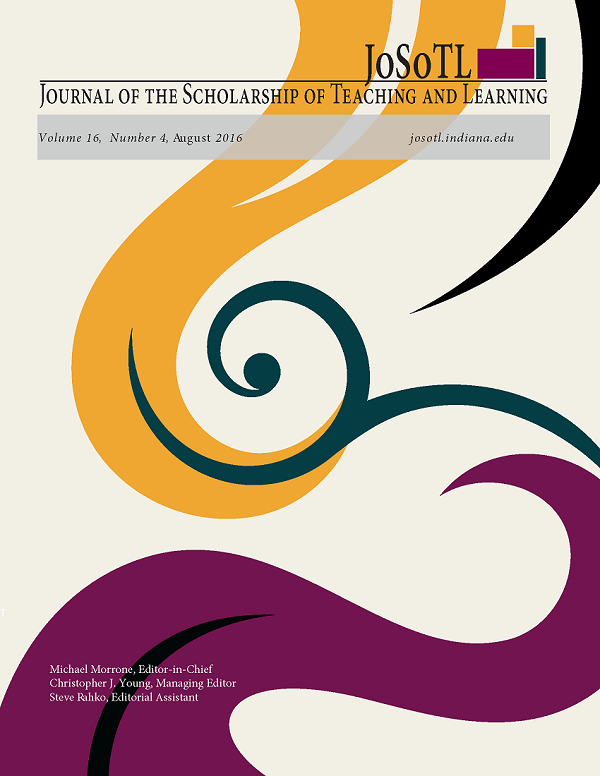Assessing Public Health Majors through the Use of e-Portfolios
Main Article Content
Abstract
Downloads
Article Details
- Authors retain copyright and grant the Journal of the Scholarship of Teaching and Learning (JoSoTL) right of first publication with the work simultaneously licensed under a Creative Commons Attribution License, (CC-BY) 4.0 International, allowing others to share the work with proper acknowledgement and citation of the work's authorship and initial publication in the Journal of the Scholarship of Teaching and Learning.
- Authors are able to enter separate, additional contractual agreements for the non-exclusive distribution of the journal's published version of the work (e.g., post it to an institutional repository or publish it in a book), with an acknowledgement of its initial publication in the Journal of the Scholarship of Teaching and Learning.
- In pursuit of manuscripts of the highest quality, multiple opportunities for mentoring, and greater reach and citation of JoSoTL publications, JoSoTL encourages authors to share their drafts to seek feedback from relevant communities unless the manuscript is already under review or in the publication queue after being accepted. In other words, to be eligible for publication in JoSoTL, manuscripts should not be shared publicly (e.g., online), while under review (after being initially submitted, or after being revised and resubmitted for reconsideration), or upon notice of acceptance and before publication. Once published, authors are strongly encouraged to share the published version widely, with an acknowledgement of its initial publication in the Journal of the Scholarship of Teaching and Learning.
References
Andre K. (2010). E-portfolios for the aspiring professional. Collegian, 17(3), 119-24.
Bierer, B., Dannefer, E., Taylor, C., Hall, P., & Hull, A. (2008). Methods to assess students’ acquisition, application, and integration of basic science knowledge in an innovative competency-based curriculum. Medical Teacher, 30, 171-177.
Glenn, D. (2011, June 15). Assessments of Student Learning Vary Widely by Field. The Chronicle of Higher Education. Retrieved from http://chronicle.com/article/Assessments-of Student/127917/.
Hayward, L. M., Blackmer, B., Canali, A., Dimarco, R., Russell, A., Aman, S., & Rossi, J. (2008). Reflective electronic portfolios: A design process for integrating liberal and professional studies and experiential education. Journal of Allied Health, 37(3), 140-159.
Lewis, K. O., & Baker, R. C. (2007). The development of an electronic educational portfolio: An outline for medical education professionals. Teaching & Learning in Medicine.19(2), 39-147.
Lorenzo, G., & Ittelson, J. (2005). An overview of e-portfolios. Educause Learning Initiative, 127.
Mooney, J. (2014). Guide for Busy Academics No. 4: Learning through reflection. The Higher Education Academy. Retrieved 7 June 2014.
Moores, A., & Parks, M. (2010). Twelve tips for introducing e-portfolios with undergraduate students. Medical Teacher, 32(1), 46-49.
Northouse, P.G. 2007. Leadership: Theory and practice, 4th ed. Sage: Thousand Oaks, CA.
Peacock, S., Morss, K., Scott, A., Hislop, J., Irvine, L., Murray, S., & Girdler, S. T. (2009). Using ePortfolios in higher education to encourage learner reflection and support personalized learning. In J. O’Donoghue (Ed.), Technology supported environments for personalized learning: Methods and case studies (pp. 185-211). New York, NY: Information Science Reference.
Peacock, S., Gordon, L., Murray, S., Morss, K., & Dunlop, G. (2010). Tutor response to implementing an ePortfolio to support learning and personal development in further and 17 higher education institutions in Scotland. British Journal of Educational Technology, 41(5), 827-851.
Peacock, S., Murray, S., & Scott, A. (2011a). Exploring the learning experience of ePortfolios for formative and summative feedback in the healthcare professions. Edinburgh, UK: Queen Margaret University.
Peacock, S., Murray, S., & Scott, A. (2011b). The transformative role of ePortfolio feedback in healthcare learning. International Journal of ePortfolio, 1(1), 33-48.
Perks and Gallantino (2013). The Development of an ePortfolio as a Capstone in a Holistic Health Minor. International Journal of ePortfolio, Volume 3, Number 1, 39-46.
Suskie, L. (2009). Assessing Student Learning: A common sense guide, 2nd edition. San Francisco, CA: Jossey-Bass.
Van Wesel. M. & Prop. A (2008). The influence of Portfolio media on student perceptions and learning outcomes. Maastricht University.
Walvoord, B.E. (2010). Assessment: Clear and simple, 2nd edition. San Francisco, CA: JosseyBass.
Zimmerman, E. (30 June 2012). Career couch: Showcasing Your Work, in an Online Portfolio. New York Times. Retrieved 7 June 2014.
